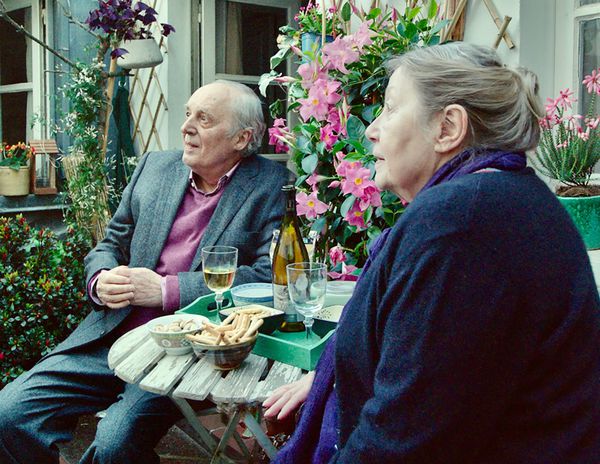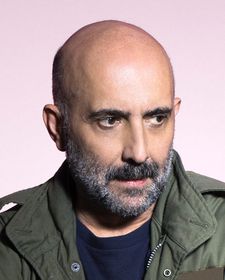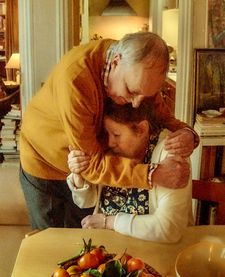 |
| Director Gaspar Noé’s twin idols: Dario Argento and Françoise Lebrun in Vortex Photo: Wild Bunch |
I remember when his first sensation Irreversible seared its way into my brain after its premiere in Cannes in 2002 with an extended rape scene that was unbearable and scarcely watchable. I recall diving for cover at the ejaculation scene in the 3D Climax and being totally disorientated by Enter The Void. Hardly surprisingly he was totally exhausted after six years of working on the latter that perhaps he decided on a less confrontational subject for his latest foray Vortex.
It could also have had something to do with a close encounter with his own mortality when, just before the pandemic hit in earnest, he suffered a brain haemorrhage and he was whisked off to hospital and hooked up to a ventilator.
 |
| Gaspar Noé: 'I never pushed the boundaries. When I arrived on the scene the doors were already open' Photo: UniFrance |
After a visit home to Argentina to see his father, then 88, on New Year’s Eve he returned to Paris fired with enthusiasm and ten pages of a script. His mother had died of dementia after losing her mind over eight years. His father is full possession of his faculties, survived Covid, and has never been busier painting and writing.
“The idea was to make a film around dementia and the time leading up to it. With some forms of the condition you know it is going to get worse and worse and people are put in a situation of terror. I don’t get scared by horror films as such but I admit I was a bit terrified of The Texas Chain Saw Massacre but I find something like Rumanian director Cristian Mungiu’s 4 Months, 3 Weeks and 2 Days. Situations from the real world get to me every time,” he says.
For his seventh feature he hired two names who had been idols for him. He had admired Françoise Lebrun from the days when she had worked with Jean Eustache on The Mother And The Whore. As for Italian horror guru Dario Argento, they had struck up a friendship over the last three years and kept meeting up regularly. Noé recalls: “He is very charismatic on screen and in life. I did not think he would do it, and I called on his brother in order to convince him. Then a film that he was going to direct suddenly got delayed which mean he was available for me. He made a few suggestions for the script and his French is good enough to improvise.
"When you film with another director you never get bored because during any breaks you spend the whole time talking about cinema.”
His choice of Alex Lutz as the son also fell easily into place. “I’d seen his film Guy by chance and was blown away by his performance. I stuck his photo next to his ‘parents’ and it worked perfectly. We met, and he was available. And when he told me he had himself directed Guy from a 10-page screenplay, I figured we were well suited!”
Noé admits he is bad at making career plans. Surprisingly he doesn’t consider himself to be a rule-breaker. “I never pushed the boundaries. When I arrived on the scene the doors were already open. I never had any censorship issues and weirdly all my films have been well accepted.
 |
| Dario Argento and Françoise LeBrun in Gaspar Noé’s Vortex. Gaspar Noé on Argento: 'He is very charismatic on screen and in life' |
Although an aficionado of watching films on the big screen Noé admits that he has succumbed to the nocturnal pleasures of watching movies late at night at home. He muses: “I love falling asleep watching a movie. I go into a dream state but I am not disrespectful to the filmmaker because I always rewind to the bit where I nodded off.”
Finding finance for the new film was relatively easy. He feels that Michael Haneke’s Amour paved the way for producers to feel more relaxed about films dealing with death. “Even the producers of Amour made money from it, but before that death as a subject was considered a turn-off for audiences yet we all grow old and many of us lose our minds,” he suggests.
He used split-screen techniques, partly by accident and then by design. He recalls seeing Forty-Deuce by Paul Morrissey (a contemporary of Andy Warhol) who used split screen for film about young male prostitutes around New York’s 42nd Street. “It was shot in 1982 using two cameras. I saw it when I was 19 and it made a big impression although he did not use the concept properly. With Vortex I had so much material that I ended up editing on split screen, but it was not meant to be like that. I wasn’t sure how it would develop but it gave me the idea of editing the whole movie in split screen. When I saw the result I thought I would keep it that way,” he recalls.
The critics have been enthusiastic and normally stoic industry insiders such as Clare Binns, joint managing director at Picturehouse Cinemas, has shared her excitement: “I am head over heels in love with this film and its ambition and emotional heft. This is what cinema is all about.” It won best film at the Virgin Media Dublin Film Festival earlier in the year, the Prix Zabaltegi at San Sebastián last year and the Critics’ Choice Award in Hamburg.
Noé has had few problems finding backers for his projects. “My films generally are very cheap to make and I shoot most of them over two or three weeks. One genre I haven’t explored is a war movie. You know, one day I might try it,” he concludes tantalisingly.
Vortex is currently showing in the US. It will be released in the UK on May 20. Richard Mowe talked to Gaspar Noé during the Unifrance Rendezvous-vous with French Cinema in January.





















